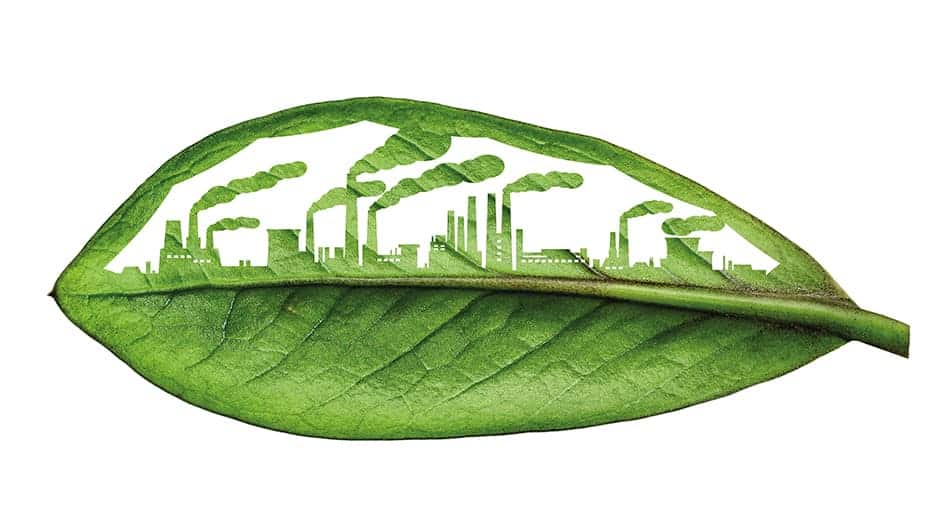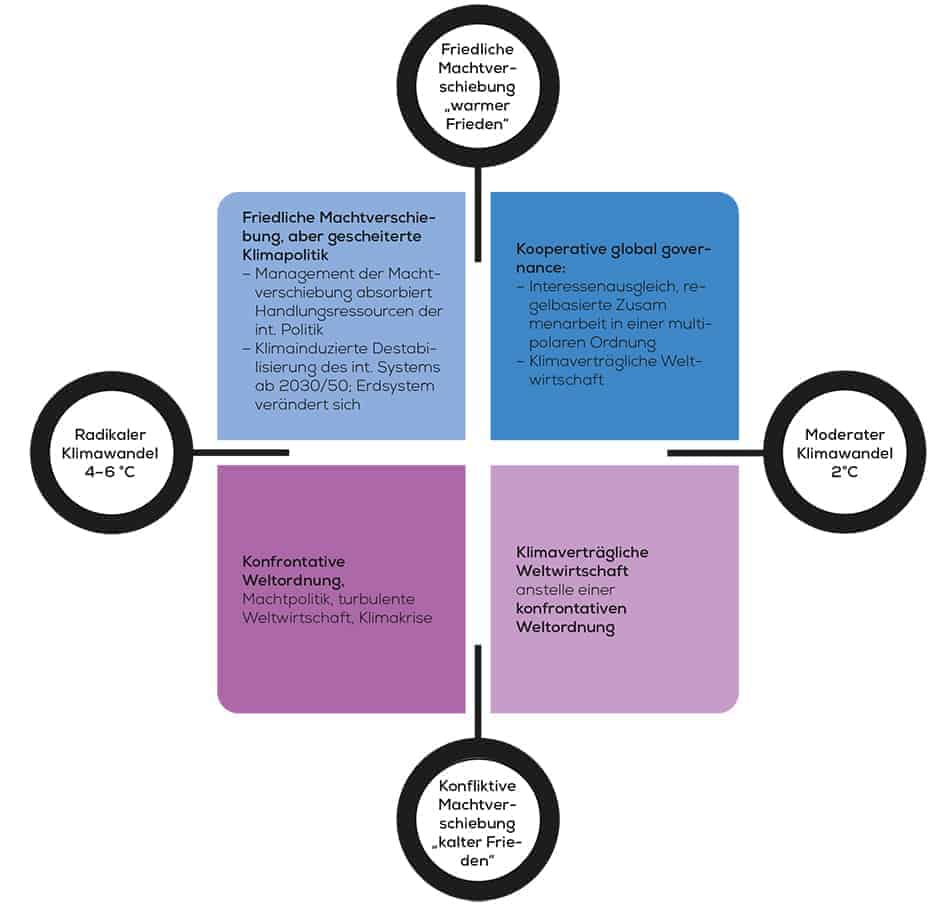Sustainability expert Dirk Messner in an exclusive interview about the global change, the great transformation - and how it will change the life of business and people.
Dirk Messner (1962) is director of the German Development Institute (DIE) and co-director of the Center for Advanced Studies on Global Cooperation Research / Duisburg. Messner studied Political Science and Economics and advises not only the German government, but also the Chinese government, the European Union, the World Bank and other international organizations on issues of global development and international cooperation. He co-chairs the climate researcher John Schellenhuber German Advisory Council on Global Change (WBGU), 2011 he published with the WBGU the study "society contract for a great transformation. The way to a climate-friendly world economy ".
"If everything stays as it is, nothing stays as it was."
Dirk Messner on the necessity of the great transformation
Mr. Messner, why are you so optimistic?
Two decades ago, we knew that a change to sustainability would be necessary to avert harm from humanity. Almost all heads of state and government have signed this up at the end of the great World Environment and Development Conference 1992 in Rio. However, the possibilities to initiate such a change have only arisen since then. Today all elements of the sustainability transformation are there. The technologies to promote resource- and climate-friendly economies, the economic and innovation policy concepts to set new course, an increasing number of actors that are already driving the green transformation: cities, companies, some governments, international organizations, research institutions.
The sustainability transition can also be financed. We are at a tipping point at which the course can be set again. Immanuel Kant would say: The “conditions of possibility” for the transformation have formed.
Which steps are necessary now?
It is interesting to note that there are hardly any decision makers left, whether in Europe, China, Morocco or the USA, who contradict the basic diagnosis that a transformation of sustainability is necessary. This opens windows for change. But: Economic and political decision-makers, but also many citizens worry about whether such a far-reaching transformation can really succeed. That's why demonstration projects that show what's possible are very important. If the German energy transition, which amounts to a radical conversion to renewable energy sources, succeeds, this would result in global investments in green energy supply systems. Architects who develop zero-energy buildings at reasonable cost can steer urban development in a new direction. The first generation of zero emission cars is in the making. Such pioneering achievements are crucial to accelerate the transformation. In addition, politics could do a lot. Most important is a price for greenhouse gas emissions to set the right price signals. For example, emissions trading needs to be reformed so that greenhouse gas emissions prices reflect the damage they bring.
How can politics be motivated?
The sustainability transformation is no longer a niche issue; it finds supporters in all parties and social classes. We citizens have to fight for this change. Governments also need to understand that in any case a major transformation is underway. If everything stays as it is, nothing stays as it was. If we continue on our resource- and greenhouse gas-intensive growth path, from 2030 we will have to adapt to changes in the earth system that would become increasingly difficult to control: water and soil shortages, sea level rise, extreme weather events, thawing of permafrost with unpredictable consequences, melting of the Greenland ice sheet - that is a global crisis scenario. The alternative is to initiate the transition to a climate-friendly and resource-efficient economy. Countries that do this first will become the leading economies of the coming decades. There is much discussion about this in China, for example: the next big wave of innovation in the global economy will be green.
"The transition to a climate-friendly economy implies a far-reaching structural change that will generate winners and losers.", Dirk Messner on opponents of sustainability
Does "green transformation" endanger the competitiveness of companies?

This question initially reflects a legitimate concern as to whether cost-intensive climate protection investments and policies could lead to distortions of competition, for example between steel mills in Germany and in Russia. As a result, production relocations would be conceivable, which would not help the global climate. Three aspects are important here: Firstly, climate protection policies must give energy-intensive companies time to modernize in a climate-friendly way. In the European emissions trading system, companies have received too much time in the form of free emission certificates, in order to switch to climate-friendly production. Secondly, incentives for climate compatibility can create new sustainable competitive advantages. These would arise if German or European steel companies succeeded in becoming pioneers of climate-friendly steel production. Third, the transition to a climate-resilient economy implies far-reaching structural change that will generate winners, such as renewable energy suppliers, and losers such as coal-fired operators. The transformation to sustainability therefore understandably has many opponents in high-carbon sectors.
Will the citizen and consumer have to do without the transformation?
Technological leaps in efficiency will be part of the solution: climate-friendly energy and mobility systems, resource-efficient industrial production. But we will also have to review our lifestyles and individual purchasing decisions. As long as long-haul flights are not climate-friendly, we exceed the annual greenhouse gas budget with every transatlantic flight that would actually be available to every citizen of the world. We can buy cars that are low in greenhouse gases and products that are more durable. We can try to avoid that 40 percent of the food that is produced ends up in the trash in everyday life. But we can also think about welfare concepts that are not only geared towards the gross national product per capita. Many studies show that once their basic needs have been met, people are particularly satisfied when there are trusting relationships in their environment, social networks, security in their societies, reliability of public institutions, access to education, health and social fairness. Above all, we consumers should see ourselves as citizens, whose happiness depends not only on consumption opportunities, but also on the outlined conditions of a good life.
Is financing for transformation really possible?
Most studies show that the global community needs to invest around two percent of the global gross national product in the sustainability transformation, and that the costs of unrestrained environmental change were significantly higher than preventive action. However, significant upstream investments will be needed to build climate-resilient energy and urban infrastructures, for example. In the process of transformation, it's all about enforcing the assets of societies, future interests and capabilities against powerful past and present interests. Investing in new climate-friendly infrastructures works like investing in building education investment. They cost a lot of money initially, but in any case have a positive impact on our companies in the future.
Can the green turnaround prevail against the crisis?

This is an open question. Particularly in the indebted Western industrialized countries, it is currently difficult to mobilize the necessary investments to build climate-friendly infrastructures. Only in a few countries are these discussions for more growth to reduce high unemployment actively linked to a green restructuring of the economies. It will be very important to show with the energy transition in Germany and the Danish low-carbon strategies that competitiveness, employment and sustainability need not be opposites. In Spain and other crisis countries, green investments have stalled. The crisis may therefore lead to a prolongation of fossil growth patterns, which in turn would create path dependencies that make the transition to climate compatibility more difficult and more expensive in the future. There are some indications that the emerging economies could accomplish the transformation rather than the currently heavily indebted OECD countries. China has high foreign exchange reserves, which could finance the necessary investments in low-carbon sectors. In addition, the emerging economies are already in a socio-economic transformation mode due to their high economic dynamism. In such a context, an orientation towards sustainability could be easier to achieve than in crisis-stricken and reform-tired OECD countries.
What can each individual do?
I have already said a lot about what we as consumers can do concretely. But too often the sustainability debate is conducted as a renunciation discussion that deters. But ultimately, we all need to strive to develop a lifestyle that will enable the soon to reach nine billion people to lead a dignified, secure life in democratic societies. It is about a new world view, a change of our thinking, a cultural achievement of civilization. First of all, realism is needed - we have to accept the limits of the Earth system within which human development can be achieved on a lasting basis. Everything else would be irresponsible.
Then it comes to social, political and economic innovations, i.e. creativity and departure to create sustainable societies. If you watch committed architects reinvent climate-friendly cities, you get a feeling that climate compatibility has little to do with “doing without” and a lot to do with entrepreneurship. And we have to learn to consider the long-term consequences of our actions for other societies and many next generations. It is a question of justice.
Ultimately, it is about accepting people - in the singular and as a global community - that we must take responsibility for the stability of the Earth system, because that is the only way to prevent us from initiating an earth system change with an uncertain outcome in the coming decades. I compare the sustainability transformation with the epoch of enlightenment. At that time, big things were also "invented": human rights, rule of law, democracy. Immanuel Kant has beautifully summarized the core of this epoch. For him, the essence of the Enlightenment was the "change in the way people think".
Photo / Video: Shutterstock, DIE / Messner, Option.




